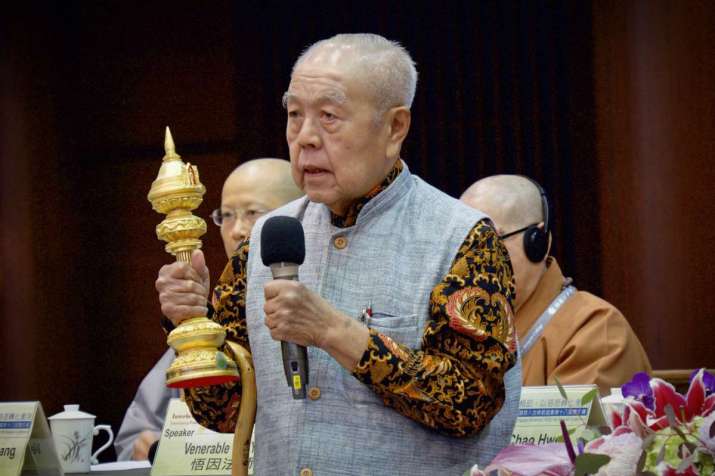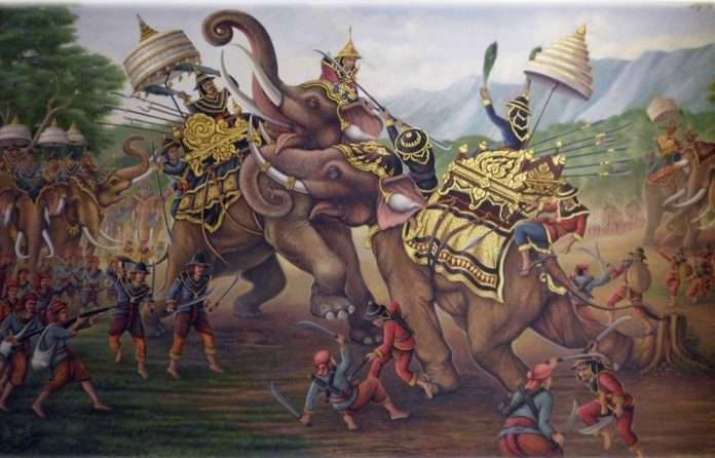NEWS
Thai Military Court Defers Lèse-Majesté Charges Against Prominent Buddhist Activist Sulak Sivaraksa
 Buddhist activist Sulak Sivaraksa speaking at a conference for the International Network of Engaged Buddhists in November. Photo by Craig Lewis
Buddhist activist Sulak Sivaraksa speaking at a conference for the International Network of Engaged Buddhists in November. Photo by Craig LewisA Thai military court on Thursday postponed a decision on whether to prosecute the noted scholar and Buddhist activist Sulak Sivaraksa under the kingdom’s notoriously strict lèse-majesté laws. The 84-year-old social critic, best known internationally as the founder of the International Network of Engaged Buddhists (INEB), could face a prison sentence of up to 15 years, if found guilty, for questioning the historical accuracy of the story of a 500-year-old battle between a Thai king and a Burmese prince.
The court on Thursday acceded to Sulak's request to forward views from experts and historians for the case and scheduled a new hearing for 17 January.
The allegations of lèse-majesté center on a presentation Sulak gave at Thammasat University in Bangkok in 2014, in which he spoke on a 16th-century elephant battle between King Naresuan and the Burmese Crown Prince Mingyi Swa. According to popular accounts, King Naresuan’s victory forced the Burmese army to abandon their invasion of the ancient kingdom of Ayutthaya—an emotionally charged tale that has been immortalized in Thailand in countless books, plays, and films, and is commemorated annually as Thai Armed Forces Day.
During the seminar, Sulak reportedly questioned the historical accuracy of the story, telling those assembled “not to easily believe in anything, otherwise they will fall prey to propaganda.” (Khaosod English)
Thailand’s lèse-majesté laws, which forbid criticism of the monarchy, have been strongly enforced under the current military government, which seized power in a coup in 2014, and many people have been punished with jail sentences. Critics have accused the junta of using the law to silence detractors and curtail free speech, but the military government asserts that the law is necessary to protect the country’s revered monarchy.
A self-proclaimed royalist, Sulak frequently states his belief that “loyalty demands dissent,” which is also the title of his autobiography. He has been charged with lèse-majesté on at least four separate occasions in the past, but has never been convicted. He was also instrumental in inspiring students to overthrow a military dictatorship in 1973. Since becoming a constitutional monarchy in 1932, military coups have been a regular feature of Thailand’s political landscape.
“To live in this country you must have a sense of humor because my case is nonsensical,” Sulak commented to reporters waiting outside the court on Thursday, adding that it would be impossible for Thais to study history if commenting on King Naresuan is considered illegal. (Bangkok Post)
The three-year-old accusations only resurfaced in October this year, although Sulak said at the time that he did not know why the authorities had decided to move ahead with the case. “If the country was normal and there existed rule of law in this country, then there won’t be problems,” said the elderly social justice advocate. “The lèse-majesté law protects the current monarch and if someone is charged for criticizing a king who reigned 500 years ago, then something is not normal.” (Khaosod English)
 A painting depicting the tale of King Naresuan's elephant battle with the Burmese Crown Prince Mingyi Swa. From khaosodenglish.com
A painting depicting the tale of King Naresuan's elephant battle with the Burmese Crown Prince Mingyi Swa. From khaosodenglish.comA renowned academic, author, and humanitarian, Sulak co-founded INEB in Thailand in 1989 with the aim of connecting engaged Buddhists around the world and promoting understanding, cooperation, and networking among inter-Buddhist and inter-religious groups to address global issues, such as human rights, conflict resolution, and environmental concerns. While a Buddhist organization, INEB welcomes members from other spiritual traditions and recognizes the importance of interfaith activities. The network’s members include monastics, activists, academics, and social workers from more than 25 countries in Asia, Australasia, Europe, and North America.
“The junta’s abusive use of the lèse-majesté law has reached a new height of absurdity when a prominent scholar is charged with a criminal offense for questioning the occurrence of a 16th-century battle,” said Brad Adams, Asia director for Human Rights Watch. “Governments should make it clear to the Thai junta that prosecuting a renowned scholar for his historical analysis will have an enormously detrimental impact on Thailand’s reputation as a center for learning and academic freedom. The case against Sulak Sivaraksa should be immediately and unconditionally dropped.” (Human Rights Watch)
See more
Thai court postpones decision on academic's charges (ABC News)
Court postpones decision on Sulak’s lese majeste charges (Bangkok Post)
Time to drop Sulak charges (Bangkok Post)
Buddhist faces 15 years in jail for questioning historical accuracy of royal elephant battle (ABC)
112 CASE MOVES FORWARD AGAINST HISTORIAN FOR DOUBTING 16TH CENTURY ‘ELEPHANT DUEL’ (Khaosod English)
Thailand: Prominent Scholar Faces 15-Year Term (Human Rights Watch)
The International Network of Engaged Buddhists
Related news from Buddhistdoor Global
International Network of Engaged Buddhists Focuses on Conflict, Compassion, and Interbeing at 18th Biennial Conference in Taiwan
Ven. Prayudh Payutto Bestowed Somdej Rank in Thai Supreme Sangha Council
Thailand’s New Draft Charter Compromises on Calls to Enshrine Buddhism as State Religion
Thai Buddhist Scholar Cautions Against Enshrining Buddhism as State Religion
Related features from Buddhistdoor Global
Living Dr. Ambedkar’s Vision
Exploring Engaged Buddhism with Professor Christopher Queen














